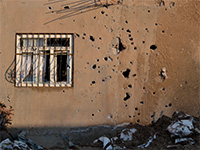For some time, civil wars have been the predominant type of armed conflict and many of them have been recurring wars. Debates about the onset, termination, and recurrence of civil wars commonly address power relations and political arrangements between adversaries.
PRIF Working Paper No. 33 “The Dataset on Post‐civil War Power and Compromise, 1990–2012” by Thorsten Gromes and Florian Ranft contributes to these debates by introducing novel variables on military balances and political compromises after 48 civil wars that ended between 1990 and 2009. It is structured as a time series in which each observation represents one post-conflict year in a government-rebel dyad between 1990 and 2012. Overall, the dataset covers 554 post-conflict years in 33 countries and includes in-depth case descriptions that document and substantiate all coding decisions made. An initial application suggests that greater divergences between political compromise and military balance contribute to the recurrence of civil war.
This PRIF Working Paper is available as a free PDF download.
